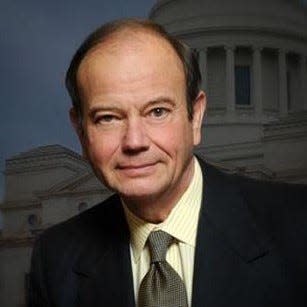A personal choice | Steve Barnes

It’s the account of a passage in the lives of an Arkansas couple, told here in more or less their words. Save for the smallest details, their memories of that time coincide. You will understand that, herein, they prefer to be “he, him or his” and “she, her or hers.” And “they.”
He was in his early 30s and she was a couple years younger, a pair of professionals not yet in mid-career. He had children from a previous marriage. They adored their stepmother, who took them to her bosom as if she had birthed them. The newlywed couple had a full social and business agenda, hardly uncommon in their situation, but as parent and step-parent they carved as much time from their schedules as circumstances permitted and a visitation agreement allowed, which was never as much as they, or the children, preferred. Prior to marrying, the husband and wife had not discussed, not seriously, the possibility of bringing into the world a child biologically theirs, a lad or lass who would be a half-sibling to the kids they were nurturing. But such joy did she take from her role as a part-time mom that, inevitably, she began to wonder …
The shopworn phrase applied – her clock was, in fact, ticking. Complicating matters, an adolescent illness and the surgery it had demanded greatly impaired her ability to conceive. Procreation was not impossible, she and he were told, but the odds were against them. The in vitro fertilization process would be, yes, expensive, quite; and likely not covered by health insurance. It also would be not infrequently uncomfortable, probably a little embarrassing. And even demeaning, emotionally as well as physically – “invasive,” in the cautionary language of the Mayo Clinic. They should understand that the process was not for everyone. No matter their individual or shared temperaments, the couple had best understand what she-he-they were about to undertake.
The undertaking, the understanding, included one more thing, a very important thing: If the procedure and the pharmaceuticals it required could produce absolute joy, if perhaps in unintended multiples, the opposite could occur. Not simply disappointment, but heartbreak: congenital abnormalities – birth defects – possibly fatal. At the wife’s age, the odds of an adverse outcome were significantly elevated. Too, the chance of an ectopic pregnancy, a serious risk to her health. She and her husband were advised to take their time, think it over, weigh the potentialities. Were they prepared to confront fetal deformity?
One of the physicians observed that an option was available to the couple in the event that profound fetal developmental issues were diagnosed in utero, to include malformation so egregious that survival outside the womb would be impossible. Whether that was a comfort to them, offered them any encouragement, was for them to decide. Perhaps it was anathema. But the option was there, was theirs. Again, the doctors emphasized, she and he should discuss it, carefully.
So they did. For hours, over days. There were conversations with close friends and relatives. There was their own independent research and reading. There was prayer. They called the fertility specialist and told him they wished to proceed.
The first stages of the treatment were exactly as demanding, and every bit as invasive as the doctors and the clinical literature had counseled. Neither she nor he had ever felt so psychologically vulnerable, exposed. Aspects of marriage that ordinarily were reserved to the privacy of the home were now the business of not only their doctor but technicians, nurses, accounting personnel and laboratory staff. Her husband or, at times, sympathetic coworkers administered, if nervously, the injections.
They were nearing the final step in the procedure: implantation. She, like her husband, had been a pro-choice advocate her entire adult life, notwithstanding the admonition against abortion that was almost central to her birth family’s creed. Now she needed to tell him something, something important, even if it was something he already knew –should she conceive, and should tests reveal a fetal abnormality, an anomaly of any kind, she would not exercise that option, the one she knew was available to her, that the doctors had reminded her of, that the law provided her. She would not be able to bring herself to do it. She wanted that option for every woman, she said, for every woman should have that option. That choice.
Her resolve was not tested because she did not conceive. So, aside from sadness, there were no complications, no need to consider that option, the one that women had, the one that was settled law.
Steve Barnes is the host of "Arkansas Week" on Arkansas PBS.
This article originally appeared on Fort Smith Times Record: A personal choice | Steve Barnes
